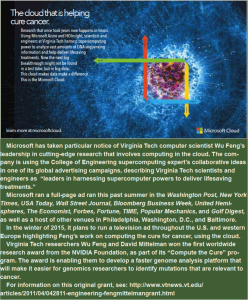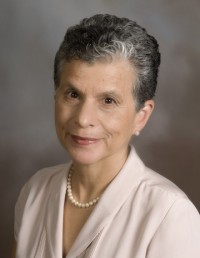Check out the postcard on Wu Feng sent via mail to all Virginia Tech College of Engineering Alumni.

 Can’t read this? We can’t either. See text below.
Can’t read this? We can’t either. See text below.
Microsoft has taken particular notice of Virginia Tech computer scientist Wu Feng’s leadership in cutting-edge research that involves computing in the cloud.
The company is using the College of Engineering supercomputing expert’s collaborative ideas in one of its global advertising campaigns, describing Virginia Tech scientists and engineers as “leaders in harnessing supercomputer powers to deliver lifesaving treatments.”
Microsoft ran a full-page ad ran this past summer in the Washington Post, New York Times, USA Today, Wall Street Journal, Bloomberg Business Week, United Hemispheres, The Economist, Forbes, Fortune, TIME, Popular Mechanics, and Golf Digest, as well as a host of other venues in Philadelphia, Washington, D.C., and Baltimore. In the winter of 2015, it plans to run a television ad throughout the U.S. and western Europe highlighting Feng’s work on computing the cure for cancer, using the cloud. Virginia Tech researchers Wu Feng and David Mittelman won the first worldwide research award from the NVIDIA Foundation, as part of its “Compute the Cure” program. The award is enabling them to develop a faster genome analysis platform that will make it easier for genomics researchers to identify mutations that are relevant to cancer.
For information on this original grant, click here.
The cloud that is helping cure cancer. Research that once took years now happens in hours. Using Microsoft Azure and HDInsight, scientists and engineers at Virginia Tech harness supercomputing power to analyze vast amounts of DNA sequencing information and help deliver lifesaving treatments. Now the next big breakthrough might not be found in a test tube, but in big data. This cloud makes data make a difference. This is the Microsoft Cloud.











